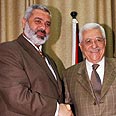
Haniyeh and Abbas. Hamas strengthened
צילום: איי אף פי
Most Israelis, Palestinians want peace talks
Joint Israeli-Palestinian survey reveals 3 out of 4 Israelis, Palestinians oppose unilateral moves in West Bank, advocate negotiations over agreement. Meanwhile, only 37 percent of Palestinians want Hamas to recognize Jewish state
Only 23 percent of Palestinians and 17 percent of Israelis prefer unilateral steps to negotiation over a settlement for the regional conflict, a new joint survey published by the Harry S. Truman Institute for the Advancement of Peace at the Hebrew University in Jerusalem and the Palestinian Center for Public Opinion in Ramallah revealed.
According to the poll, which was conducted between March 16-21, 73 percent of the Palestinian public and 76 percent of the Israeli public prefer that further withdrawals in the West Bank be carried out in the framework of bilateral talks, and not unilaterally. The poll also showed that 60 percent of Israelis support negotiations over a permanent peace agreement with Palestinian Chairman Mahmoud Abbas.
The survey also examined the effect of the dramatic political change in the Palestinian Authority on the willingness of both sides to mutually recognize each other's national identity, and the willingness of the Palestinians under a Hamas-led government to recognize the State of Israel. According to the poll, only 37 percent of Palestinians advocate recognition of Israel by the Hamas, while 59 percent oppose such recognition, even in the event of international pressure on the PA.
However, on conditions of peace and after the formation of an independent Palestinian state, 66 percent of Palestinians and 68 percent of Israelis are willing to mutually recognize Israel as the land of the Jewish people and Palestine as the land of the Palestinian people.
Notably, similar support figures were also expressed in a poll conducted in September 2005, before Hamas rose to power.
If the declaration of a Palestinian state takes place in the framework of negotiations with Israel, 80 percent of the Palestinians would back it, and 17 percent would object it, the survey indicated. As for the Israeli public, 83 percent prefer to see such a move being carried out under talks with Israel, while 14 percent said they would rather have it as a unilateral move.
PA: Hamas gained strength
Following Hamas' win in democratic elections, the Palestinians' view of democracy and human rights didn't show any change. 34 percent believe that the current situation of the democracy in the PA is good, or very good. On the other hand, among Israelis only 6 percent believe that state of democracy is good or very good. In addition, 58 percent of Israelis believe that Hamas aspires to conquer Israel and kill most of its Jewish residents. A majority of Israelis, 55 percent believe that the chances Hamas will moderate and recognize the State of Israel are low, or very low.
And what about Hamas' power in the Palestinian street? It seems that Hamas keeps its strength, if not even getting stronger. If the elections were held today in the PA, 47 percent of the Palestinian voters would vote for Hamas , and 39 percent for the Fatah. Moreover, 46 percent of respondents said they voted for Hamas in the elections of January 2005, while 44 percent reported that they voted for the Fatah.
The poll also examined the sense of security in day-to-day life. On a personal level, 75 percent of the Jewish population is worried, compares to 24 percent that are not worried of harm to themselves or their family members by Arabs. The poll surveyors indicate this figure represents a small increase from the previous poll conducted in June 2005, where 71 percent of the Jewish population were worried compared to 27 percent who were not.
Among Palestinians, a rise in personal threat is observed after Hamas' rise to power. According to the poll, 75 percent believe that their personal safety and their family's are not assured, compare to 64 percent who believed so in June 2005.
The Palestinian sampling represented residents of the Gaza Strip and east Jerusalem and included 1,270 people over the age of 18 who were interviewed in 127 sites in the Gaza Strip, the West Bank, and east Jerusalem, in personal interviews under the supervision of Dr. Khalil Shakaki.
The Israeli data was gathered using phone interviews among a sampling of 603 adults, under the supervision of Dr. Yaakov Shamir from the Truman.










